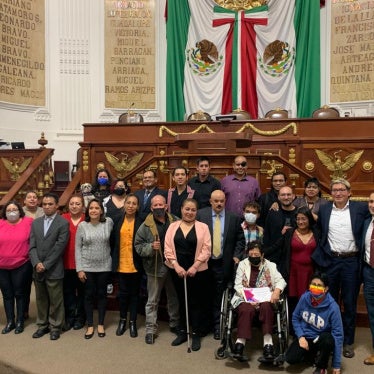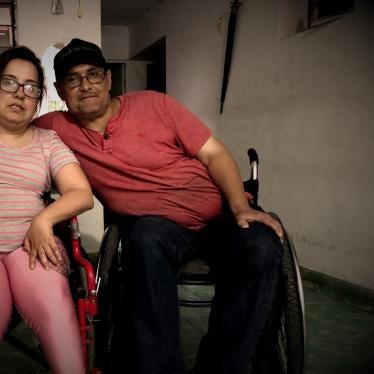August 30, 20116
Ms. Catalina Devandas Aguilar
Special Rapporteur on the rights of persons with disabilities
Mr. Juan Méndez
Special Rapporteur on torture and other cruel, inhuman or degrading treatment or punishment
Mr. Dainius Puras
Special Rapporteur on the right of everyone to the enjoyment of the highest attainable standard of physical and mental health
Dear Ms. Devandas, Mr. Méndez, and Mr. Puras,
Human Rights Watch writes to urge you, in each of your respective mandates, to give immediate attention to a new General Law to Prevent and Sanction Torture and Other Cruel, Inhuman and Degrading Treatment that is currently under consideration in Mexico (General Law on Torture, hereinafter GLT).
The Mexican Senate has already approved the bill’s project and the Chamber of Deputies has to review it in the ordinary session that will start on September 1, 2016. Although the bill has groundbreaking contents that will help Mexico harmonize its domestic legislation with international human rights standards to combat torture, there is one specific provision that raises serious human rights concerns and which highlights the urgent need for Mexico to take steps to comply with its obligations under the Convention on the Rights of Persons with Disabilities (CRPD);[1] the Convention against Torture and Other Cruel, Inhuman or Degrading Treatment or Punishment (CAT)[2]; and the International Covenant on Economic, Social and Cultural Rights (ICESCR)[3]. We respectfully ask you to raise these issues with the Mexican government and highlight their importance.
Article 24, subsection III, of the GLT establishes that a person commits the crime of torture when he or she “performs a medical or scientific procedure on someone without his or her consent, or without the consent of a person who has the legal mandate to give it on his or her behalf.”
What is particularly concerning here is the inclusion of the expression “scientific procedures” in the text of the law. The intended meaning of this language is unclear and its broad scope could deliberately exclude from the definition of torture situations where people with disabilities are subjected to scientific experimentation without their free consent, simply because that person’s guardian chose to allow the procedure. Scientific experimentation on persons with disabilities without their free and informed consent is expressly prohibited by article 15 of the CRPD. The GLT should take care not to water down this absolute prohibition by seeming to allow for the possibility that people’s legal guardians could consent to their being subjected to scientific experimentation. The Mexican authorities should amend it to make its meaning clearer and less dangerous in scope.
The GLT also labels non-consensual medical procedures as torture, while carving out an exception for medical procedures consented to by a person’s legal guardian but not by the person themselves. This may be a logical accommodation of Mexico’s current legal framework, but one that reveals in stark terms the incompatibility of that framework with Mexico’s international human rights obligations. We urge you to highlight this fact in your interactions with the Mexican government, and underscore the urgent need for action on the larger issue of ensuring full respect for the legal capacity of persons with disabilities.
The CRPD Committee has said that non–consensual medical treatment, including forced treatment by psychiatric and other health and medical professionals, is a violation of the right to equal recognition before the law and an infringement of the rights to personal integrity; health (including free and informed consent); freedom from torture; and freedom from violence, exploitation and abuse.[4]
Non–consensual medical treatment has led to the systematic use of forced interventions worldwide, as the Special Rapporteur on Torture has pointed out; these interventions, often wrongfully justified by theories of incapacity and therapeutic necessity inconsistent with the CRPD, are legitimized under national laws, and may enjoy wide public support as being in the alleged “best interest” of the person concerned.[5] The GLT, currently under discussion in Mexico, should not open the door to give a lower level of protection to persons with disabilities against torture and ill treatment.
Article 12 of the CRPD affirms that people with disabilities should enjoy full legal capacity in all aspects of life, on an equal basis with others. This includes decisions about health care. The Convention also requires states to ensure that persons with disabilities have access to support they may require to exercise that legal capacity. The Committee on the Rights of Persons with Disabilities, which guides states on the CPRD’s implementation, has stressed that this requires states to move away from systems of substitute decision making for people with disabilities, such as guardianship, and towards new models of supported decision making. Mexico has failed to take appropriate steps in this direction, and retains a legal framework that limits or strips the legal capacity from some people with disabilities under a guardianship system. The text in the GLT that seeks to accommodate this defective legal framework by treating medical procedures authorized by guardians as consensual serves to highlight the urgent need for reform.
In his 2013 Report on torture in the context of healthcare settings, the Special Rapporteur on Torture notes that deprivation of legal capacity (when a person’s exercise of decision-making is taken away) constitutes a situation of powerlessness, whereby the victim is under the total control of another person.[6] Medical treatments of intrusive and irreversible nature, when lacking a therapeutic purpose, may constitute torture or ill treatment when enforced or administered without the free and informed consent of the person concerned.[7] Medical treatments that are discriminatory in nature have been applied to women with disabilities alleging medical necessities that have led to their sterilization without their free and informed consent.[8]
Previous mandate-holder, Manfred Nowak, also highlighted that persons with disabilities are exposed to “medical experimentation and intrusive and irreversible medical treatment without their consent (e.g. sterilization, abortion and interventions aiming to correct or alleviate a disability, such as electroshock treatment and mind altering drugs including neuroleptics).”[9] Mr. Novak added that he was concerned that in many cases such practices, when perpetrated against persons with disabilities, remained invisible or are being justified, and are not recognized as torture or other cruel, inhuman or degrading treatment or punishment. Mr. Novak concluded that the acceptance of involuntary treatments runs counter to the provisions of the CRPD.[10] He called on countries to review the anti–torture framework in relation to persons with disabilities.
The prohibition against torture also applies to doctors, health professionals and social workers, including those working in private hospitals, other institutions and detention centers. Mr. Juan Mendez has stated that, “while the prohibition of torture may have originally applied primarily in the context of interrogation, punishment or intimidation of a detainee, the international community has begun to recognize torture may also occur in other contexts”, such as healthcare settings, which might apply treatment without asking for informed consent of the person concerned.[11]
We greatly appreciate your attention to this critical issue and would be happy to provide any additional information that you may require.
Sincerely,
Shantha Rau Barriga
Director
Disability Rights Division
Carlos Rios-Espinosa
Senior Researcher and Advocate
Disability Rights Division
[1] Mexico ratified the CRPD in December 2007.
[2] Mexico ratified the CAT in January 1986.
[3] Mexico ratified the ICESCR in March 1981.
[4] CRPD/C/GC/1, paragraph 42.
[5] Report of the Special Rapporteur on torture and other cruel, inhuman or degrading treatment or punishment, Juan E. Méndez A/HRC/22/53, paragraph 64. February 2013. http://www.ohchr.org/Documents/HRBodies/HRCouncil/RegularSession/Session22/A.HRC.22.53_English.pdf
[6] Report of the Special Rapporteur on torture and other cruel, inhuman or degrading treatment or punishment, Juan E. Méndez A/HRC/22/53, paragraph 31. February 2013. http://www.ohchr.org/Documents/HRBodies/HRCouncil/RegularSession/Session22/A.HRC.22.53_English.pdf
[7] Ibid, paragraph 32.
[8] Ibid, paragraphs 33 and 34.
[9] Interim report of the Special Rapporteur on torture and other cruel, inhuman or degrading treatment or punishment A/63/175, paragraphs 40 and 41. July 2008. https://documents-dds-ny.un.org/doc/UNDOC/GEN/N08/440/75/PDF/N0844075.pdf?OpenElement
[10] Interim report of the Special Rapporteur on torture and other cruel, inhuman or degrading treatment or punishment A/63/175, paragraph 44. https://documents-dds-ny.un.org/doc/UNDOC/GEN/N08/440/75/PDF/N0844075.pdf?OpenElement
[11] Report of the Special Rapporteur on torture and other cruel, inhuman or degrading treatment or punishment, Juan E. Méndez A/HRC/22/53, paragraph 14.







